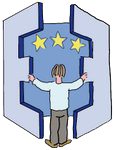Commissions and councils
The commissions and councils described below are official bodies belonging to a French public school (an EPLE, établissement public local d’enseignement). They are constituted from the members of the Administration Council (AC).
The Standing Committee
The Standing Committee deals with questions submitted to the Administration Council. It is convened at the request of the Director. It may prepare files to be presented at the AC.
The Public Tender Committee
The Public Tender Committee is presided over by the Director, as the legal representative of the school. It is composed in addition of 2 to 4 members, who are designated by the Director.
The Health and Safety Committee
The Health and Safety Committee is charged with overseeing projects for safety training and to contribute to the improvement of health and safety conditions in the school.
The Health and Citizenship Committee (CESC, Comité d’éducation à la santé et à la citoyenneté)
The Health and Citizenship Committee institutes educational projects concerned with health, sexuality, and the prevention of risky behaviors.
Discipline Council
The Discipline Council is authorized to impose disciplinary penalties on students as authorized by national law and according to the Interior Rules of the school (as an EPLE, see above).
The Pedagogical Committee
The Educational Committee is charged with reviewing the situation of pupils whose behavior is inconsistent with the rules of the school or who are not fulfilling their academic obligations. Its objective is not to punish, but to seek solutions to problems. In case of necessity, the Discipline Council may be convened.
The bodies described below are unique to the EES.
These bodies are constituted in accordance with Section II of the General Rules of the European Schools (art. 16-21). They consist of:
Two Education Councils, one for the nursery and primary cycles, and one for the secondary cycle.
Each of these Councils meets once per semester, in principle. The two Education Councils may hold joint meetings to deliberate on issues pertaining to the school as a whole.
The Education Councils are tasked with seeking to improve teaching conditions and with promoting positive and stimulating human relations. In particular, they seek to promote measures strengthening the European character of the school. They may create working groups. They may submit resolutions to the competent authorities of the European Schools. If the Director takes a decision contrary to a proposition of an Education Council, s/he must justify it to the Council. Discussion of individual students is excluded from the Education Councils’ remit.

